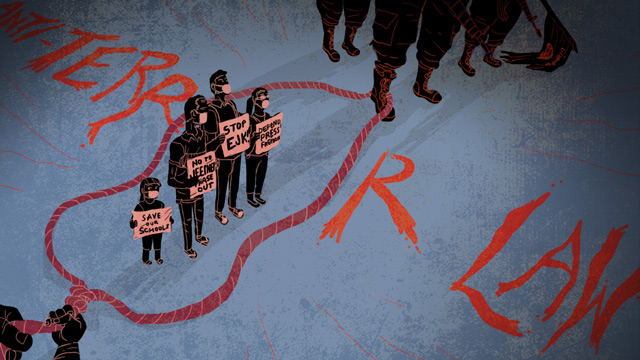

Just before day’s end on July 3, President Duterte signed into law what is now the Anti-Terrorism Act of 2020, which repeals the 2007 Human Security Act.
Republic Act No. 11479 is an abomination of a law as it conflates terrorism with legitimate dissent and can be used to suppress criticism, protest, and opposition to the government.
It makes a general rule that dissent is terrorism and makes the exception that it is not terrorism when it is an exercise of constitutional rights. But the law then makes an exception to the exception – that it is terrorism if your exercise of constitutional rights leads to public disorder or violence, whether intended or not. That is very dangerously vague and justifies the advice of National Security Adviser Hermogenes Esperon, Jr to just keep quiet as well as his observation that the law’s critics are supporters of terrorism.
Indeed, while the act will be effective only 15 days after publication, many critics of the law have brought up the abuses of the police even prior to its signing, and which would potentially be exacerbated by the law’s passage.
The Piston 6, Cebu 8, Iligan 16, and Pride 20 are just few among those who have been arrested the past few weeks without warrants and have been detained longer than is necessary. When asked, the police could not provide a violation to charge them with.
The anti-terrorism law is also unconstitutional because the Anti-Terrorism Council usurps judicial power by allowing it to order arrests up to 24 days without charges and for giving it proscription authority – to designate individuals and groups as terrorists. All of these can be done without due process.
Not a solution to terrorism
This law is based on the premise that the current law is inadequate. That is not true. The Human Security Act is already draconian. But it is ineffective not because of the law but because of implementation failures.
The law is a failure because of government failures in intelligence and prosecution and because of abuses by police, military, and security officials. A new law will not plug those failures. In fact, these failures will guarantee the failure of this new anti-terrorism law.
Terrorism is a real problem and we must defeat it. But this law will not do that. From targeting a universe of a few dozens or at most a few hundred terrorists, the law can be used against thousands, even tens of thousands of activists, critics, and dissidents.
For example, in Marawi, instead of going only after the Maute and Isis terrorists, all those angry at the government’s failures in rebuilding their beloved city can now be designated terrorists. Instead of going after the Abu Sayyaf in Sulo, military and police as well as prosecution efforts will be wasted against Lumad peoples fighting mining and other incursions against their ancestral domains.
Moving forward: what can we do now?
The first thing that people can do is to file cases or join already existing petitions challenging the constitutionality of the law. The Supreme Court, being the final arbiter of laws, has the power to ultimately decide if laws passed by the legislative are compliant with the constitution.
As of Monday, July 6, 4 petitions against the Anti-Terrorism Act has already been filed in the Supreme Court: Atty. Calleja and the De La Salle Brothers, Albay Rep. Edcel Lagman, FEU Law Dean Mel Sta. Maria, and the Makabayan lawmakers. Many other groups are also poised to file petitions, including the National Union of Peoples’ Lawyers (NUPL) and former Senior Associate Justice Antonio Carpio. It is believed that more petitions questioning the law will be filed in the next few days and weeks.
As of the end of this week, two more petitions have been filed, making a total of six: Atty. Rudolf Jurado, the president’s former government corporate counsel, and constitutional framers Christian Monsod and Felicitas Arroyo joined by Ateneo and Xavier Law professors and the Ateneo Human Rights Center (AHRC).
The second is to continue protesting and speaking up against the law. Fear is understandable at this time, but it is important not to be paralyzed by it. In fact, it is important more than ever to speak up now and to encourage others to do the same.
Let’s assert and test Section 4 of the Anti-Terrorism law that states that terrorism shall not include advocacy, protest, dissent, stoppage of work, industrial or mass action, and other similar exercises of civil and political rights.
It is to be noted that on Friday, July 10, the House committee on legislative franchises voted 70-11 (with 2 inhibitions and 1 abstention) to deny the renewal of ABS-CBN’s franchise. We condemn this action by Congress to shut down a media giant at a time when information is much needed; and we urge people therefore to keep speaking up and expressing their dissent towards such a decision.
The third, however, is to be smart. While this proviso exists in the law, it is followed by the phrase “which are not intended to cause death or serious physical harm to a person, to endanger a person’s life, or to create a serious risk to public safety.”
Therefore, the law enforcement officials and military personnel need only to allege any of these 3 for someone to be suspected of terrorism. Moreover, as already stated above, terrorism as defined in the law is overbroad, and so despite the proviso, it is easy to conflate legitimate dissent and terrorism. Hence, individuals and groups are advised to be more cautious now as they question the law. Of highest priority is to be vigilant against infiltrators who would hijack protest actions and endanger everyone.
Fourth, on a more practical level, with the spate of arrests happening now even before the law has become fully effective, it is recommended that individuals brush up on their rights particularly in preparation for the eventuality that they become apprehended by the police, and let loved ones know of their whereabouts especially if they are going to attend protests and other similar demonstrations. They should also have a list of lawyers to call if they are in fact arrested.
Fifth, we must all lobby Congress to repeal the recently signed act and enacting a better anti-terrorism law that improves on the Human Security Act in terms of respect for human rights.
Sixth, some might even want to participate in drafting the implementing rules and regulations to make the law less harmful. It would be tricky because it could be perceived as accepting the law, but we would still support colleagues who would do it.
A united front for human rights
A united front among all pro-democracy and pro-human rights Filipinos are a must at this time. Those who will be most vulnerable with the signing of the law are the marginalized – the indigenous peoples, those living beneath the poverty line, farmers, fisherfolk, and those who work with them, such as social workers and social activists. The youth are particularly vulnerable.
Let us not allow division within our ranks and instead come together to ensure the protection especially of the marginalized who will experience the brunt of this draconian law.
Besides, none of us are safe from the law, not even the retired Supreme Court Justices and law deans. If not them, their children and grandchildren are at risk with this law.
With the passage of the bill into law, many people are understandably left at a loss about how to proceed.
However, the most important thing to do right now is to remain vigilant and to continue to fight for the rights assured to us by the Constitution. Now, more than ever, we need to speak up for democracy, for our country, and for future generations. – Rappler.com
Joy Reyes is a collaborator of Professor La Viña. She graduated from the University of the Philippines College of Law and holds undergraduate degrees in Psychology and Political Science from the Ateneo de Manila University.